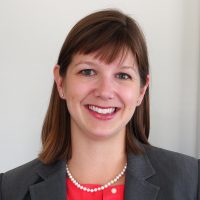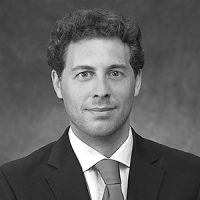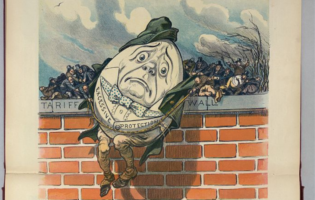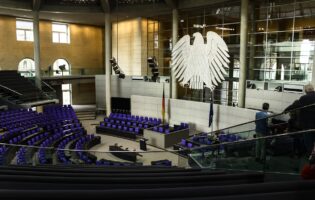The Next Generation: Remapping the German-American Relationship

David Livingston
Atlantic Council
David Livingston is Deputy Director for Climate & Advanced Energy at the Atlantic Council. Previously, he was an associate fellow in the Carnegie Endowment’s Energy and Climate Program, where his research focuses on geoeconomics, markets, and risk. He is also a nonresident associate of Carnegie Europe in Brussels.
Previously, Mr. Livingston served as the inaugural Robert S. Strauss fellow for geoeconomics at the Office of the United States Trade Representative, where he concluded as acting Assistant U.S. Trade Representative for Congressional Affairs. He also has worked at the World Trade Organization in Geneva and at the United Nations Industrial Development Organization (UNIDO) in Vienna. Mr. Livingston is an alumnus of the Atlantik Brücke Young Leaders Program.
He is a 2017-2018 participant in AICGS’ project “A German-American Dialogue of the Next Generation: Global Responsibility, Joint Engagement,” sponsored by the Transatlantik-Programm der Bundesrepublik Deutschland aus Mitteln des European Recovery Program (ERP) des Bundesministeriums für Wirtschaft und Energie (BMWi).

Henriette Rytz
German Bundestag
Dr. Henriette Rytz is a foreign policy advisor to Cem Özdemir, member of the Bundestag and head of the Green Party Germany (Bündnis 90/Die Grünen). Before joining his team, she worked as a researcher at Stiftung Wissenschaft und Politik / German Institute for International and Security Affairs (SWP), a Berlin-based foreign policy think tank. Henriette has published widely on questions of foreign policy, U.S. domestic politics, and immigration and integration, including a book that came out in 2013 (“Ethnic Interest Groups in US Foreign-Policy Making: A Cuban-American Story of Success and Failure,” New York: Palgrave Macmillan). Her passion for U.S. politics and transatlantic relations has repeatedly taken her to the U.S. for longer work stints, including at the House of Representatives, the American Institute of Contemporary German Studies in Washington, D.C., and Yale University. Ms. Rytz holds a Ph.D. in Political Science and an M.A. in International Relations from the Free University Berlin. Ms. Rytz is vice chairperson of the board of Humanity in Action Germany, a transatlantic human rights network.
She is a 2016-2017 participant in AICGS’ project “A German-American Dialogue of the Next Generation: Global Responsibility, Joint Engagement,” sponsored by the Transatlantik-Programm der Bundesrepublik Deutschland aus Mitteln des European Recovery Program (ERP) des Bundesministeriums für Wirtschaft und Energie (BMWi).

Jessica Hart
Director, Finance and Operations
Jessica Hart is the Director of Finance and Operations at AICGS. She has held a number of roles at AICGS, including Financial Officer, Communications Officer, and Research Program Coordinator. Before joining AICGS, Ms. Hart worked at the OSU Foreign Language Center, for an Ohio senatorial campaign, and at the Institute for Cultural Diplomacy in Berlin.
Ms. Hart holds an MA in Political Science from the University of North Carolina at Chapel Hill, a BA in Political Science and International Studies from The Ohio State University, and a graduate certificate in Nonprofit Management from Johns Hopkins University.
__

Kirsten Verclas
ORISE Science and Technology Policy Fellow
Kirsten Verclas is an ORISE Science and Technology Policy Fellow. Previously, she was a Program Manager in the International Department of the National Association of Regulatory Utility Commissioners (NARUC) working on regulatory partnerships in Africa under a NARUC-U.S. Agency for International Development (USAID) Cooperative Agreement. Before coming to NARUC, Ms. Verclas was a Senior Program Manager at the American Institute for Contemporary German Studies (AICGS) at Johns Hopkins University, where she managed the Institute’s grant projects. She initially joined AICGS as Executive Assistant in 2003 and started working in the Institute’s Research Program in 2008. Ms. Verclas has written extensively on energy and climate as well as security policy in the transatlantic context. She holds a BA in International Relations with a Minor in Economics from Franklin and Marshall College and an MA in International Relations with a concentration in Security Studies from The Elliott School at The George Washington University. She also earned an MS in Energy Policy and Climate from Johns Hopkins University in August 2013.
She is a 2017-2018 participant in AICGS’ project “A German-American Dialogue of the Next Generation: Global Responsibility, Joint Engagement,” sponsored by the Transatlantik-Programm der Bundesrepublik Deutschland aus Mitteln des European Recovery Program (ERP) des Bundesministeriums für Wirtschaft und Energie (BMWi).

Parke Nicholson
Parke Nicholson was previously the Senior Research Associate at AICGS. He was selected to participate in the Munich Young Leaders 2016 program at the 52nd Munich Security Conference. Previously, he worked at the Center for the National Interest and the Council on Foreign Relations. In 2008, he served on the foreign policy staff at Hillary Clinton’s presidential campaign headquarters. He has also worked abroad in Austria and Germany: in 2005 through the Fulbright Program in Klagenfurt and in 2010-2011 as a Robert Bosch Foundation Fellow working in the German Foreign Office for the Coordinator of Transatlantic Cooperation and for Daimler AG’s Political Intelligence unit in Stuttgart.
Parke has recently published in Foreign Affairs, The National Interest, The Baltimore Sun, and the Frankfurter Allgemeine Zeitung. He received his MA in International Relations from The Elliott School of International Affairs at The George Washington University and a BA in History and Violin Performance at The College of Wooster in Ohio.
Policy Report 63
This year’s Symposium is framed around the idea of “A New Transatlantic Generation.” We know that German-American relations have long been shaped by the personal connections that were established after World War II and held firm throughout the Cold War. Since reunification, however, there has been a rapid drawdown of the American troop presence in Europe and the United States has shifted its focus to other parts of the world. Funding for long-standing transatlantic exchanges has also been decreased and, just this past year, the U.S. government was close to cutting half of the funding for the Congressional Bundestag Exchange Program for young leaders, a mainstay of the German-American partnership.
At the same time, it is abundantly clear that the experiences and ideas of the younger generation will determine the trajectory of transatlantic relations in the twenty-first century. Their preferences will shape domestic politics as much as international politics. Their decisions will determine how the world responds to a multitude of emerging crises. Their innovations will be the driving force for our respective societies. The contributions of young educators, journalists, politicians, scientists, and other experts is vital for maintaining and strengthening the bond between Germany and the United States.
This collection of essays is not meant to be representative of the views of the “Millennial” generation, but each author presents her or his own serious critique of a pressing issue for the upcoming transatlantic generation and their suggestions for the way forward. This volume features essays from Matthias Matthijs on the need for German leadership, Nicola Fuchs-Schündeln on the response to the euro crisis, David Livingston on the future of the carbon-based economy, Henriette Rytz on Germany becoming a “country of immigration,” Parke Nicholson on the global response to jihadist terrorism, Jessica Riester Hart on the current state of immigration policy, Tim Maurer on international cooperation on cyber security, and Kirsten Verclas on energy efficiency as a key to addressing climate change.
AGI looks at the challenges and the choices facing Germany and the United States as this young generation shapes how both countries deal with common problems and find solutions. The Institute attempts to evaluate the consequences of their preferences and choices and to what extent we can learn from each other. This Policy Report and Symposium address the future of the German-American relationship, and represent an illustration of how we can contribute to a better understanding of both countries, their priorities and policies, and the impact they will continue to have on each other in the decades to come.










